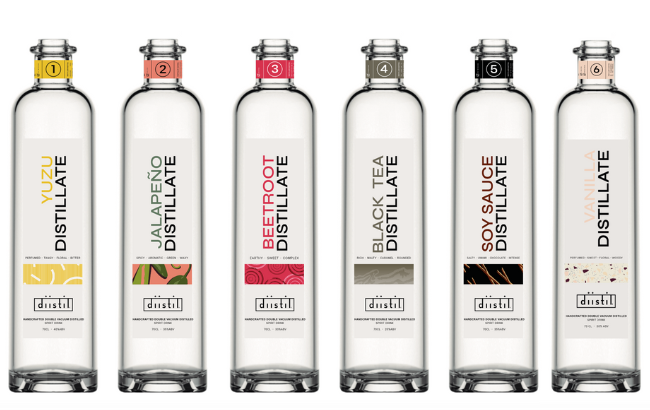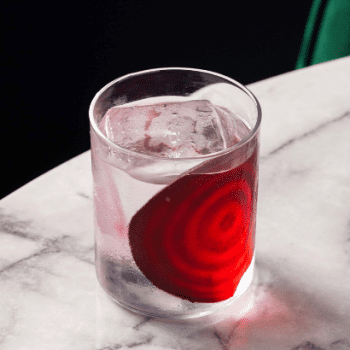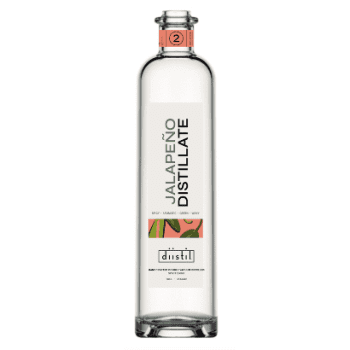Diistil creates on-demand distillery for bartenders
Inspired by the Deliveroo model, former investment banker Raj Batra tells The Spirits Business why he created an on-demand distillery that enables the on-trade to make its own unique distillates.

When Batra became a father in 2020, he swapped his 15-year career in finance at the likes of Deutsche Bank and Merrill Lynch to pursue a new innovation he believed would fill a gap in the alcohol industry – one that called for a tech-enabled, personalised experience for bartenders.
Diistil, an on-demand distillation company that offers bartenders the opportunity to create or commission innovative flavoured spirits, was not born from market research, but rather from ‘off-the-cuff’ conversations Batra had with members of the on-trade while he sat on the consumer side of the bar.
“I had the pleasure of advising lots of exciting companies, and I met lots of interesting people, and lots of interesting teams, all solving very exciting problems – mainly using tech, or they were just innovative – but either way, they were doing something different. And one group of companies that I liked a lot were the ones that offer really tailored products to their customers.”
Tech innovation
Batra uses Deliveroo and Uber as examples of innovative companies that disrupted their respective industries, noting that the two lead the “first wave” of innovation-forward businesses that created a more personalised experience and solution for both companies and consumers. It was these innovations, and this problem-solving selling point, that lead Batra to form his ideas for Diistil. “I said why don’t we try and bring that personalised experience to the alcohol industry? And that’s where it came from, so I had the idea with my wife – which is where most of my good ideas come from – and we saw a lot of gin experiences where you can go to a distillery and you can make your own, and I said, why doesn’t someone make a tech version of this, or a more innovative version of this?

“And so the idea was to give that creative power to the people who make the best drinks, which is the bartender. Rather than us trying to guess what the best trends are, why don’t we give the people that actually know what they’re doing the power to have their own brand?” Batra explains.
“I did do research,” he clarifies, “but with hindsight, not enough. And my research was more focused on the distillation side, because I’m a banker – I knew nothing about distillation.” However, Batra did solicit advice and guidance from friends and acquaintances in the on-trade at bars he had been visiting as a patron for years in a bid to make sure he was on the right lines with the product and the business plan.
He notes: “I really respected and felt precious about the trust [the bartenders] put in me, because it’s one thing to see a guy that you know because he comes in to your bar, but another thing to say, we’re now going to trust you with our products.”
Batra tells us that once Diistil had landed accounts with the likes of The Experimental Group, Henrietta, and other high-end venues in London, the business was able to grow organically, built on “trust and credibility”.
“It does help to have a great team around me, and it helps that actually having other credible people around me gave them confidence. Because, you know, quite frankly, why should they just take a former finance guy at face value? But I think eventually, with the relationships we’ve built, the credibility of my team and the product all really worked for us.”
A distillery for everyone
Batra explains that the company has two arms, one that offers solutions to the on-trade and another that targets corporate businesses. “We want to sell to everyone, but the core customer is the bartender. We want them to have the power, effectively, to have a distillery extension. So, using my Deliveroo example, every business can now have a takeaway offering. Every bartender, whether they’re from a high-end venue or a pub can have their own distillery.”

The flavour experience that Diistil offers is a key element that Batra says he is excited about. “The idea is the world is your oyster. It shouldn’t be constrained. If you want us to do a London dry, which has the scriptures rules, we’ll do that. But a lot of the time the creatives want interesting flavours distilled.”
The distillation takes place at the company’s lab in east London and is overseen by its head distiller Maxwell Whitney.
The company has also been working with the University of Nottingham’s Food Innovation Centre since December 2021, which has given Diistil access to the university’s ‘cutting-edge’ research and technical knowledge in the field of food innovation, allowing it to ‘push the boundaries of flavour exploration’.
‘Bespoke means bespoke’
When it comes to creating bespoke distillates, Batra notes that the bar or individual can be as hands-on as they like, and that “bespoke means bespoke”, with “wacky requests” always considered.
Batra shares that The Zetter in Clerkenwell, London, opted to create a bespoke neroli distillate, and has also taken one of the brand’s classic distillates, beetroot, to incorporate it into the venue’s menu. “We’ve done some really exciting R&D with them,” he says.
“There’s certainly things that are harder. For example when you distil something, even if you’ve got the state-of-the-art equipment that we do, and you’ve got the great team that know how to use the technical stuff, you need the oils from from the product to be able to distil it. And so everything can be distilled, but does the flavour come out strong enough?
“If Max says this flavour will work, we know it will work. If he says no, it means no. If he says ‘I can try’, we know it will probably work, or we’ll find an alternative. Sometimes, if you’re trying to solve for a flavour note, we can, under the team’s guidance, suggest an alternative product to distil, because once it’s distilled, the aromas and so on will come off separately.”
Batra notes that typically, Diistil can take a product from conception to bottling within four weeks. “If there’s a delay, it’s normally on the client’s side, as they may take longer signing off,” however he notes that typically the excitement of the finished product and a desire for it to be come quickly means delays are often avoided.
Other delays could be caused by the sourcing of appropriate ingredients that are of high-quality from the best regions. Artificial flavours are avoided, and ingredients are distilled to optimal flavour points in a bid to maintain a clear spirit.
The minimum order for bespoke distillation is 25 bottles, which start at £35 (US$45) plus VAT each for trade customers.
In addition to Diistil’s bespoke distillation service, it also has a core range of spirits that allows bartenders and consumers to buy as they would any other product. The core distillate range currently comprises yuzu, jalapeño, beetroot, black tea, soy sauce, vanilla and a seasonal chocolate orange expression, which Batra notes fills gaps in the current off-trade flavour offering.
“The idea is that going forward we have this option where people can just order products with us, whether it’s an individual flavour, whether it’s a whole recipe, or they can take a product that’s off the shelf but still amazing.”

Diistil provides a catalogue of cocktail recipes on its website, highlighting the ways in which its core portfolio can be utilised. “You can choose a flavour profile, choose the difficulty level, and it gives you the full recipe you can swipe across. We’ve got about 60 cocktails on there,” he says. These recipes have by and large been provided by the community of bartenders that has been cultivated by Diistil. Batra notes that the goal is to empower bartenders and give them the tools to create the best drinks. “Bartenders are the key people for the industry. They set the trends.”
He adds: “We make tools for other creatives. Artists or people online can have Adobe AI and Final Cut Pro. Why not give bartenders the tools to make the best drinks and give them the respect they deserve? And then we can use that feedback to create great products for everybody else.”
Going forward
Batra explains that he initially ‘bootstrapped’ the business, and the company has recently received investment of an undisclosed sum from angel investors.
Following two years of organic growth, the company is about to embark on its first marketing push, with the aim of driving brand awareness within the on-trade, with an immediate focus on the Christmas gifting market, however, he stresses that it is the bartenders that he wants to get the brand in front of as a priority for sustainable growth, and he believes that as experts in their craft, they are more likely to be influenced by recommendations from their peers or Diistil’s team members, rather than just general brand awareness.
“I’m very much about brand awareness, but I would rather do that in a more curated way. As much as I’d love to be global tomorrow – and we’ve had interest from the US and Europe – we have to refocus on our home market first.
“We have to build a brand and awareness and grow our customer base here in the UK. So BCB London, which is next year, is probably more appropriate for us versus Bar Convent Berlin, where a lot of the customers are global and don’t quite make much sense for us right now.”
Related news
IBD launches first on-demand course for distillers
